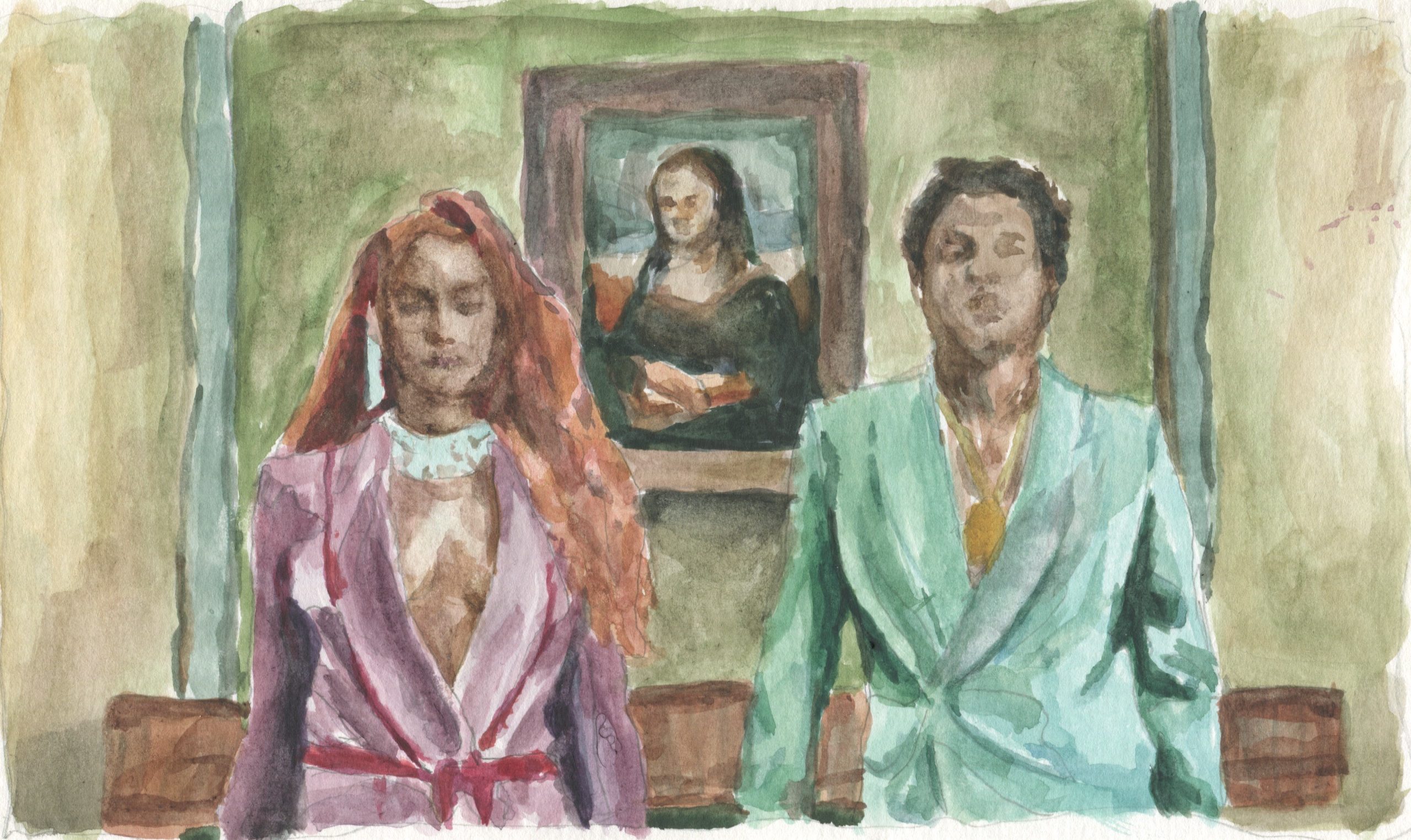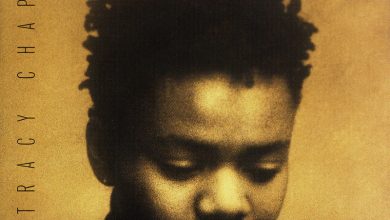Not Everything is Love: Why We Need to Kill the “Ride or Die” Chick

Art by Eve Anderson.
(Content warning: This article contains discussions of sexual assault and domestic abuse.)
Beyoncé and Jay-Z’s release of their joint album, “Everything is Love” back at the beginning of the summer of 2018 not only made it clear that they’re two major players in the music industry (who else could go on an album tour without sharing what album the tour was for until much later?), the album drop also put a public conclusion to the musical drama that was their marriage. The public first got wind of the affair that went on in their marriage back in 2016 when Beyoncé dropped her visual album “Lemonade” and then through Jay-Z’s own album 4:44 a year later. Given that “Everything is Love” is the Carter’s means of making it clear to the world that they’re back in musical matrimony, motifs throughout the album include love, forgiveness, as well as flexing their money. The most striking one out of all of them was the romanticization of the “ride or die” chick.
The “ride or die” chick dates back beyond Beyoncé. Mary J. Blige and Method Man rhapsodize about her through lyrics like “You’re all, I need to lie together/ Cry together/ I swear to God I hope we fucking die together.” But it’s been a recurring motif within the music of Queen Bey and her man Jay-Z since their hit song “03 Bonnie and Clyde” back in 2003. In each iteration, the “ride or die” chick is a woman whose loyalty is unwavering to her man nor matter the cost or the danger. This trope comes with too many costs, but from the way it’s romanticized within Rap and Hip-hop, barely anyone can hear how harmful it is.
Jay-Z clearly can’t. In his outro for the song “713” on Everything is Love, we learn the damage that had been done to Beyonce through her willingness to be Jay-Z’s “ride or die” chick: multiple miscarriages.
“To all the good girls that love hustlers/ To the mothers that put up with us/ To all the babies that suffered ’cause us/ We only know love because of ya.” Jay-Z turns the damage he’s done to Beyonce into some sort of greater good just because he’s gained some character development out of it. This feels wrong, but to those who romanticize the “ride or die” trope, this is only one expected outcome.
When Jay-Z raps “America is a motherfucka to us/ Lock us up, shoot us/ Shoot our self esteem down, we don’t deserve true love/ Black queen, you rescued us, rescued us” in the album’s outro “713,” he clearly means it as a compliment to not only Beyonce, but Black women in general. Here he’s saying that Black women’s willingness to be resilient in their relationships with Black men is what’s keeping them from crumbling under a white supremacist society. But the way his flattery frames the Black struggle against white supremacy as something that Black men solely suffer through speaks to another problem with how the “ride or die” gets romanticized: it perpetuates the misconception that Black men have a monopoly on the Black struggle.
America is a motherfucka to Black women just as much as it is to Black men. Perhaps even more so seeing as Black women sit at the crossfire between a racist and sexist society. But from the way the “ride or die” archetype tells Black women that our liberation lies in the amount of labor we put in to fighting the ways in which Black men struggle with white supremacy, the fact that Black women struggle under the same structure gets forgotten. We’re ultimately left to fend for ourselves.
Police brutality isn’t only a problem for Black men; it’s a problem for Black women as well, admittedly even more so seeing as police are more likely to kill an unarmed Black person if they’re a woman. Looking at the way most media attention is given to Black male victims of police violence as well as the way most efforts to mobilize around cases of police brutality, you would never have expected a statistic like that. The vast majority of people can remember the names of Trayvon Martin, Michael Brown, Eric Garner, and Freddie Gray, but barely anyone can recall Reika Boyd, Natasha McKenney, Aurora Rosser, or Tanisha Anderson, the woman killed 10 days before 12 year old Tamir Rice was shot on a playground. Despite the fact that the #BlackLivesMatter movement was created by three Black women, hardly any of the hashtags made to highlight Black female victims of police violence have gone viral. The one victim to get any attention from both the Black community or mainstream media was Sandra Bland.
Back in the summer of 2015, Bland was arrested for not indicating while changing lanes. A video went viral of police officers pinning her to the ground while she could be heard asking the officers why they had her head on the ground. Three days after, she was found dead in her cell.
But besides Bland, neither mainstream media nor the general public pay much attention to the police violence Black women experience. Sandra Bland’s own mother called out activists for the lack of support shown to Black female victims during a public symposium on police violence:
“By a show of hands, can any of you tell me the other six women who died in jail in July 2015 along with Sandra Bland?” she asked a crowd gathered in Washington, D.C.
“That is a problem.”
Even in Bland’s case, a new movement had to be made to bring light to her death. The hashtag #SayHerName was started just to bring attention to Black female victims of police violence since we were pretty much pushed outside of the public’s mind frame. Yet this movement is still being co-opted and framed in a way that brings the focus back once again to Black male victims of police violence with the way the hashtag #SayHisName keeps being used.
Basically, with how busy the “ride or die” chick has us playing the role of Black men’s supporters, Black women aren’t given any space to also be victims from the same violence Black people in general experience from white supremacy. We’re not given the space to be victims of the violence inflicted upon us by Black men.
Domestic abuse/interpersonal violence is one of the leading causes of death for Black women in the U.S. Black women die from domestic abuse/interpersonal violence almost three times more than White women. More than 20% of Black women are raped in their lifetime. But because being Black men’s “ride or die” means prioritizing the way in which Black men are persecuted within society, our problems get put out of mind. This has gone on to create a culture where Black women feel the need to be silent about our abuse. Seeing as the “ride or die” trope makes Black women responsible for Black men’s character, to too many, speaking out means feeding into the racist stereotypes surrounding Black men. Not to mention, with how much energy Black women spend fighting against Black men’s treatment by police and the criminal justice system, getting authorities involved with our abuse is seen as a form of betrayal even though it’s meant to bring about our own form of justice. We’re seen as selling them out to the same system we’re all meant to stand against.
What might be the worst thing about the romanticization of the “Ride or Die” archetype is the fact that the ones busy doing the romanticization won’t even reciprocate. The same ones singing praises about Black women putting up with Black men’s abuse, who keep singing about their “Black queens” holding them up won’t stop supporting the one’s bringing us down. Just look at the music industry. Many of the most powerful and the most revered artists within the Hip-Hop and Rap industry are rapists and domestic abusers.
Back in October 8, 2016, 20-year-old rapper XXXTentacion was arrested and then later charged with aggravated battery of a pregnant woman, domestic battery by strangulation, and false imprisonment for allegedly assaulting his ex-girlfriend Geneva Ayala. In a profile for the Miami New Times, Ayala detailed how Tentacion abused her. She spoke about how he’d swing between physically abusing her to emotionally manipulating her into staying with him. She recounted one point in time when XXXTentacion had her pick out a barbecue fork to penetrate her with. She also spoke out about the time when she was pregnant where XXXtentacion had beat her so badly he broke her eye socket and caused her to lose some vision in the eye. He later took her phone and left her for two days to heal in his manager’s back room because he didn’t want to take her to the hospital. Ayala also spoke about how Tentaction would threaten to kill himself to get her to stay, one time even filling up a bathtub then threatening to throw in a microwave.
When XXXtentacion was killed this summer, he had racked up 15 felony counts related to the assault. And yet, from Kanye to T-pain to J. Cole, many of Rap and Hip-hop’s most famous figures made him out as some kind of martyr. In a series of tweets T-Pain even went as far as trying to characterize domestic abuse as an everyday thing just to justify his support of Tentacion.
Kendrick Lamar made waves for speaking out against racial injustice back when he released his song “Alright” and gave a Grammy performance in 2016 that brought light to the mass incarceration of Black men. Since then he’s been hailed as one of the music industry’s “wokest” rappers, but like many Black men within the music industry, his interest in issues affecting the Black community ends where Black women’s issues begin. He showed this when he pushed back at Spotify’s attempt at holding its abusive artists accountable by way of removing them from company curated playlists. The streaming service ended up removing its policy after Lamar allegedly threatened to pull all his music from the site in support of Tentacion.
Childish Gambino’s guilty of doing this too, albeit in a different way. In the music video for his song “Feels Like Summer,” Gambino gave what was basically a wrap up of what all went down in the Hip-hop industry over the summer through cartoon cameos of different artists like Chance the Rapper, Travis Scott, 21 Savage, Azealia Banks, Drake, SZA, and many others in what looked like a neighborhood barbeque. Most of the scenes within the video make references to real life occurrences that happened within the Hip-hop scene.
Kanye’s cameo was the most notable. He shows up in Gambino’s video silently crying against the video’s black backdrop while wearing his MAGA hat. Just a couple seconds after, Michelle Obama shows up and hugs him, and slowly Kanye’s tears stop falling. Between his vocal support of Trump to calling slavery a matter of choice, West did an about-face on racial issues little before Gambino dropped his video. No doubt Gambino was referring to that whole media fiasco within the video, but by presenting Michelle Obama hugging Kanye as some sort of solution, he was thereby reinforcing the idea of the “power” of the “ride or die” chick.
Gambino, throughout his early years as a rapper, made it clear how much he just doesn’t care for Black women, making us the butt of many of his earlier rap songs as well as portraying us stereotypically within his show “Atlanta” despite it being herald as a nuanced look at the lives of Black people. Him pushing the idea that Black women are some kind of solution to Black men’s behaviour is reflective of not only how the “ride or die” relationship isn’t reciprocated, but also how the trope creates a sense of entitlement towards Black women. Both Kanye and Gambino have their own spouses (who are notably non-Black women), and yet instead of looking to them for support, both are still seeking out Black women’s emotional labor as if we’re some sort of resource, not people with our own problems to deal with. It’s dismissive and dehumanizing.
By romanticizing the “ride or die” role, Black men turn Black women’s willingness to stay resilient within their relationships despite facing emotional abuse into a compliment that ultimately doubles as a way for them to opt-out of truly holding themselves accountable for the abuse they’ve wrought on Black women. Showering Black women with praises for putting up with their antics by saying that it’s what’s “saving them” from themselves turns Black women’s willingness to be “ride or dies” into some sort of remedy for their emotional abuse. Black men thereby make Black women shoulder the responsibility of molding them into better people.
Jay-Z does this to Beyoncé in the song “Family Feud” from his own confessional album 4:44.
“Yeah, I’ll fuck up a good thing if you let me/ Let me alone Becky” he raps in one line of the track. Hov is supposed to be owning up to his infidelity, but here he makes Beyoncé partially to blame saying that he’ll cheat if she allows it. Even though cheating was entirely his choice, he still makes it his wife’s responsibility to keep him from straying rather than him just remembering his wedding vows.
Feminist scholar bell hooks said it best back when Beyoncé first dropped “Lemonade”. In her essay response to the visual album titled “Moving Beyond Pain,” hooks pointed out how Beyoncé ’s rendition of Black women’s resilience as restorative only serves to preserve Black men’s emotionally abusive attitudes towards their Black female partners, because the men aren’t willing to change their ways by themselves.
“No matter how hard women in relationships with patriarchal men work for change, forgive, and reconcile, men must do the work of inner and outer transformation if emotional violence against black females is to end. […] If change is not mutual then black female emotional hurt can be voiced, but the reality of men inflicting emotional pain will still continue.”
Me calling for the death of the “ride or die chick” isn’t meant to be a diss at the women who do end up staying with partners who may have mistreated them in the past. It takes a special kind of strength to take forgive someone who’s forsaken your trust. Still, it would be dishonest to treat the “ride or die” role as something that Black women are simply just choosing to play when, looking at the backlash Black women receive over breakups with Black men, we’re not given much room to reject it.
Cardi B’s initial break-up with Offset made this crystal clear. Back around the end of last year, the “Invasion of Privacy” rapper made a (now-deleted) instagram video announcing her separation from the Migos rapper saying that “things ha[d’nt] been working between [the two of them] for a long time. Seeing as the pair’s relationship had been riddled with rumors of Offset’s infidelity starting with when they first began seeing each other (one woman even apologize on twitter for engaging in an affair with the rapper) it wasn’t hard to guess why Cardi was calling it quits. Offset somewhat confirmed everyone’s suspicions when he posted his own video apology to Cardi on Instagram, asking her to take him back as his birthday wish.
“I was partaking in activity that I shouldn’t have been taking in, and I apologize. You know what I’m saying? For breaking your heart, for breaking our promise, for breaking God’s promise and being a selfish, messed up husband.”
“I only got one birthday wish and that’s to get my wife back, Cardi,” Offset said. “We’re going through a lot of things right now, a lot of things in the media. I want to apologize to you Cardi. You know, I embarrassed you. I made you look crazy.”
Rather than giving his spouse space to sort out her feelings, the rapper amped up his public antics to the point of crashing Cardi’s historic headline set at Rolling Loud with flowers, cake, and a “Take me back” banner. Offset clearly using abusive tactics to get Cardi to take him back was already bad enough, but the unwavering amount of support he received from many of his fellow rappers made the whole situation even more insidious. Most of the men calling for Cardi’s forgiveness would never consider doing the same in her situation. 21 Savage, who brought Offset on stage during his own Rolling Loud set and got the crowd to cheer, “Cardi, take Offset back” responded to his own ex, Amber Rose’s attempts at rekindling their relationship with an Instagram post saying “You cross me once it’s fuck you for life.” 50 cent commented on one of Cardi’s posts with “That’s a cute outfit. But, you gotta go home. That boy loves you girl,” and, “No divorce, ok chill out” in spite of his own penchant for pettiness.
The fact that they only felt the need to intervene in Cardi and Offset’s relationship in order to entice Cardi to stay rather than getting Offset to stop cheating was not only frustrating to watch, it also highlighted how Black women are expected to faithfully wade out their partner’s infidelity. Offset’s cheating wasn’t a problem for them, it was Cardi’s unwillingness to ride for him any longer that needed to be rectified.
Black women are much more than collateral damage for Black men’s character growth. Our power shouldn’t be based on how much pain we can carry, and we shouldn’t be made to carry that pain alone. No matter how much the “ride or die” chick wishes for it to be, life isn’t a fairytale. Love doesn’t conquer all.
Black people need to go ahead and burn whatever love letters we have left for the “ride or die” chick because in reality they’re nothing but death notes.




